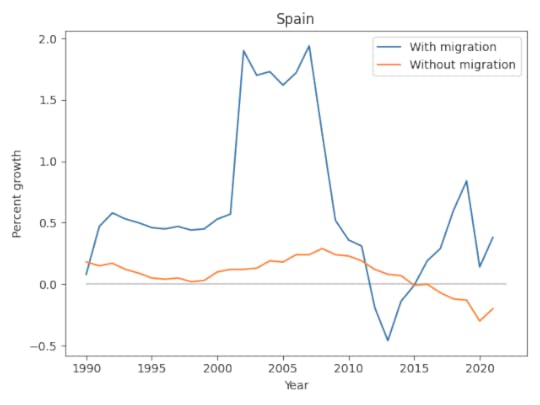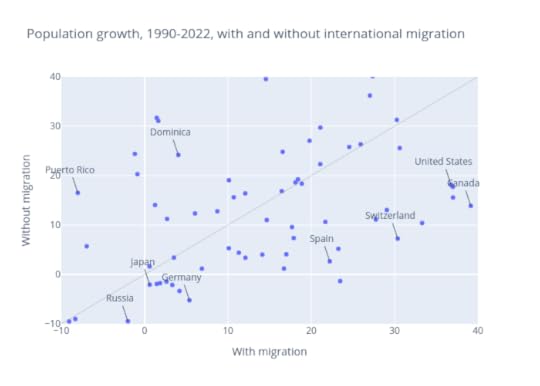Migration and Population Growth
On a recent run I was talking with a friend from Spain about immigration in Europe. We speculated about whether the population of Spain would be growing or shrinking if there were no international migration. I thought it might be shrinking, but we were not sure. Fortunately, Our World in Data has just the information we need!
I downloaded data from OWID’s interactive graph, “Population growth rate with and without migration”, ultimately from UN, World Population Prospects (2022) and processed by Our World in Data.
It includes “The annual change in population with migration included versus the change if there was zero migration (neither emigration nor immigration). The latter, therefore, represents the population change based only on domestic births and deaths.”
I selected data from 1990 to 2022. Here are the results for Spain.

In this graph, we can see:
Without migration, population growth would have been close to zero – and negative since 2015.With migration, population growth has been substantially higher except for a few years from 2012 to 2014, during a period of high unemployment and austerity measures following the global financial crisis.I’m not sure what caused the increased migration around 2001. At first I thought it might be when several Eastern European and Baltic countries joined the EU, but that was not until 2004. If anyone knows the reason, let me know.
From the annual growth rates, we can compute the cumulative growth over the 32-year period.
With migration, Spain grew by 22% over 32 years, which is very slow. Without migration, it would have grown by only 2.6%.
So the answer to our question is that the population of Spain would have grown very slowly without migration – but it is so close to zero, we were probably right to be unsure if it was negative.
All CountriesLooking across other regions and countries (and some territories) we can see more general patterns. The following figure shows actual growth rates with migration on the x-axis, and hypothetical rates without migration on the y-axis. To see the interactive version of this figure, you can run this Jupyter notebook on Colab.

Many high-income countries and regions have low fertility rates; without migration, their populations would grow slowly or even shrink. For example, the population of Europe grew by only 3.3% in 32 years from 1990 to 2022, slower than any other region. But without migration – that is, with population change based only on domestic births and deaths – it would have shrunk by 2.1%.
During the same period, the population of Northern America grew by 37%, much more quickly than Europe. But more than half of that growth was due to international migration; without it, growth would have been only 18%.
Countries in the lower-right quadrant are growing only because of migration; without it, they would be shrinking. They include several European countries and Japan.
As fertility has decreased, the populations of high-income countries have aged, with fewer employed workers to support more retirees. These aging populations depend on the labor of immigrants, who tend to be younger, willing to work at jobs some native-born workers would not, and providing skills in areas where there are shortages, including child care and health care.
However, in some countries, the immigration levels needed to stabilize the population face political barriers, and even the perception of increased immigration can elicit anti-migration sentiments. Particularly in Europe and Northern America, concerns about immigration – real and imagined – have contributed to the growth of right wing populism.
 newest »
newest »
Probably Overthinking It
- Allen B. Downey's profile
- 233 followers




It's true that the rise of populist far right in Europe is partly because of immigration, but it's more about blaming immigration for Europe's economic stagnation due to ideological underpinnings of the European project not a natural outcome as some would have you believe; otherwise if the relation was really about immigration and was a natural reaction, Turkish people should be all uber-Nazis by now since they are hosting the same amount of refugees as the whole of Europe combined and their economy is doing much worse comparatively, but the main anti-immigration party got like 2% of the vote in Turkish Elections.